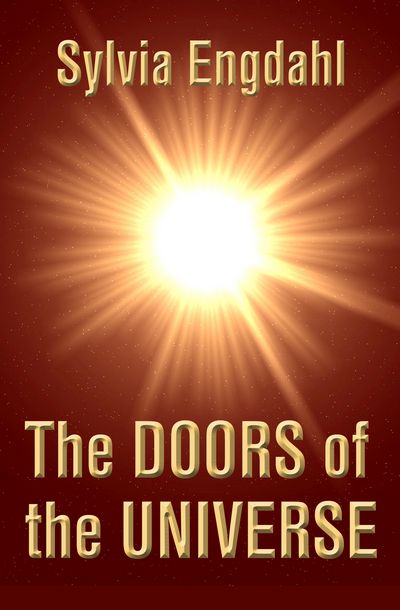
Excerpt from
The Doors of the Universe
Book Three of the Children of the Star science fiction trilogy
by Sylvia Engdahl
Suppose, just suppose, it had been possible to alter humans
genetically so that the species need not die. Noren realized, with his hand
poised above a console keyboard, that he did not want to crush this fantasy
yet. The replies to his questions were going to crush it. But suppose that
option had been open to the Founders—the Prophecy’s promises would
already have been fulfilled! He would be living in the era all Scholars wished
to see. The City would long since have been thrown open, knowledge and machines
would be available to everyone. . . .
Or would they?
No! There would be no more metal than there already was. Its synthesization wouldn’t have been achieved, and in fact it wouldn’t need to be achieved—people wouldn’t even have kept working toward it. If people could drink unpurified water and eat plants grown in untreated soil, they could survive without metal, without machines!
But the knowledge in the computers could not.
It was a circle. If it was broken, humanity would die. Yet if it had been broken in another way, a way that had enabled humans to live without the City . . . then the City would no longer exist. He would be living the Stone Age life of the villagers, and without metal resources, without people trained to preserve even the remnants of a metal-based technology, there would be no possibility of regaining such a technology in the future.
The universe would be closed to his race. Forever.
The accumulated knowledge of the Six Worlds would be lost forever.
Numb, paralyzed, Noren closed his eyes; the room had begun to swim dizzily around him. The nightmare that had eluded him earlier was assailing him now—though he was still conscious, he began to feel the familiar horror. He no longer wanted to understand its basis. He knew he could not face such understanding. He knew what significant facts the First Scholar had edited from his memories; he wished he could edit them from his own.
He should go now, walk away from the computers, forget genetics and return to his study of physics. Life would go on, as it had gone on throughout the generations since the Founding. As it would go on for a few more after him. No one else would learn what he had learned. People would be content. The villagers and Technicians would be content because they believed the Prophecy, and the Scholars would be content because they had faith in their power to bring about the Prophecy’s fulfillment. There shall come a time of great exultation . . . and at that time, when the Mother Star appears in the sky, the ancient knowledge shall be free to all people, and shall be spread forth over the whole earth. And Cities shall rise beyond the Tomorrow Mountains, and shall have Power, and Machines; and the Scholars will no longer be their guardians. Everyone believed that. Would they be happier knowing that it was false? Had he not faced exactly the same decision last year, when he’d first lost confidence in the nuclear research . . . ?
But it was not the same. Then, truth as he’d seen it had been a destructive truth. He could not have saved anyone by exposing the Prophecy’s emptiness. He could not, by sacrificing all he personally valued, have enabled future generations to live.
Could he now?
Copyright 1981, 2000 by Sylvia Louise Engdahl